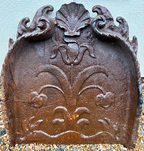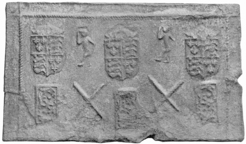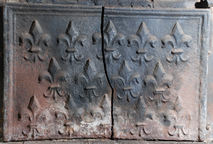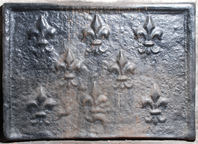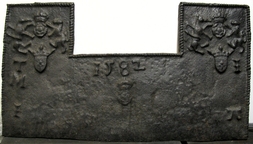-
1128
Description: Quasi-arched shape with forward-facing 'wings', which splay outwards towards the base; the 'wings' curve to follow the shape of the main panel but curl outwards at the top; central panel with pictorial image of, to the right, a shepherd holding a musical pipe, his right foot upon a log, upon which a dog, to the left, sits holding the shepherd's crook; top centre, a crown, on either side of which, on the curled upper parts of the 'wings', is an inward facing sheep.
Notes: Nothing is known about the sources of free-standing firebacks or what prompted their production. Their form is similar but the predominant use of horticultural or arboreal decorative themes, which suggests production within a limited time frame, has in this instance been replaced with a humorous scene. Only a very small number of such castings are known. Depth 210mm
- Decoration tags:
- free-standing (shape)
- none (edging)
- whole carved pattern
- heraldic
- pictorial
- animals
- humans
- plants
- objects
Manufactured: in the late-17th to early-18th century in England.
Current location: not known.
- Attached to series:
- Free-standing firebacks
-
201
Description: Rectangular; moulded fillet edging on top and sides; TCI, also arranged symmetrically, in a widely spaced triad; below, symmetrical layout of central rose and crown between two concentric roundels, with two fleurs-de-lys outside.
Notes: The style of rose and crown is similar to that used in gun founding in the Tudor period, suggesting that the furnace that was the source of this fireback may have been previously used for that purpose. Formerly at Baynards Park, Cranleigh, Surrey.
Inscription: 16 T C I [triad] 70
- Decoration tags:
- rectangular (shape)
- complex, furniture-derived (edging)
- carved stamps
- individual letters
- individual numbers
- heraldic
- royal
- text
Manufactured: in 1670 in the Weald area of England.
Current location: not known.
- Attached to series:
- 1660s-90s Wealden series
-
971
Description: Canted rectangle; fillet edging (top and sides); top centre, date between two 'rose' stamps.
Notes: The four nuts are to secure the fireback to two legs.
Inscription: 1658
- Decoration tags:
- rectangular with canted top corners (shape)
- fillet (edging)
- carved stamps
- individual numbers
- text
- plants
Manufactured: in 1658 in England.
Current location: Red Lodge, Park Row, Bristol, England.
Museum number: NX412 (part of the Bristol Museums, Galleries and Archives museum group)
- Attached to series:
- Date only firebacks
-
229
Description: Rectangular with superimposed arch; embattled, cavetto moulded edging, with the top edge of the rectangle interrupted; shield, garter, crown, supporters and motto of the English Royal house of Stuart; rose and thistle plants above lion and unicorn supporters respectively; initials split by crown; date below garter.
Notes: An example in the Musée d'Agen in France is illustrated by Carpentier (1912, p.419). A different version is at Newick Park, Sussex (no. 502).
Copies of this fireback are known.
Inscription: I R / HONI S OIT QVI MAL Y ..ENSE / 16 19
Arms: English Stuart royal
- Decoration tags:
- rectangular with round arch (shape)
- embattled cavetto (edging)
- whole carved pattern
- armorial
- royal
- text
Manufactured: in 1619 in England.
Current location: National History Museum, St Fagans, Glamorgan, Wales.
Museum number: 48.354/85 (part of the Welsh National History Museum museum group)
Citation: Carpentier, H., 1912, Plaques de Cheminées (Paris, published by the author).
-
1100
Description: Quasi-rectangular shape with inward curving sides; twisted rope edging (top and sides); arrangement of fleurs-de-lys: top centre, four in a star formation with two horizontally below; two vertically to left and right; vertical dagger, pommel to base, stamped twice inside outer fleurs.
Notes: A uniquely shaped fireback with fleurs and daggers (each about 35cm long) seen on two other firebacks (no. 595 and no. 660).
- Decoration tags:
- rectangular (shape)
- rope (edging)
- simple stamps
- carved stamps
- heraldic
- objects
Manufactured: in the mid-16th century in the Weald area of England.
Current location: Sackville College, Church Lane, East Grinstead, West Sussex, England.
- Attached to series:
- Royal series
- Knife & Dagger stamp firebacks
- Fleur-de-lys firebacks
-
1321
Description: Arched shape with (damaged) forward-facing 'wings', which splay outwards towards the base, curved to follow the shape of the main panel; central panel with stylised plant decoration surmounted with a scallop shell between six 'leaves'.
Notes: Nothing is known about the sources of free-standing firebacks or what prompted their production. Their form is similar and the predominant use of horticultural or arboreal decorative themes suggests production within a limited time frame. Only a very small number of such castings are known.
- Decoration tags:
- free-standing (shape)
- none (edging)
- whole carved pattern
- plants
Manufactured: in the late-17th to early-18th century in England.
Current location: not known.
- Attached to series:
- Free-standing firebacks
-
301
Description: Rectangular; inset twisted rope edging (top and sides); crowned Tudor royal shield stamp repeated three times across top, each pair interspersed with an 'imp' figure with right arm raised; below each shield, rectangular stamp with indistinct ?rose design, each pair interspersed with a twisted rope saltire.
Notes: The crowned shield and 'imp' figure associate this fireback with others of the Royal series; the saltires may have apotropaic significance. Illustration from Starkie Gardner 1898, p. 143.
Arms: Tudor royal arms of England
- Decoration tags:
- rectangular (shape)
- none (edging)
- simple stamps
- carved stamps
- heraldic
- apotropaic
- armorial
- royal
- humans
- objects
Manufactured: in the mid-16th century in the Weald area of England.
Current location: Stone House, Rushlake Green, Warbleton, East Sussex, England.
Citation: Gardner, J. S., 1898, 'Iron Casting in the Weald', Archaeologia, 56, 1, pp. 133-164.
- Attached to series:
- Royal series
-
75
Description: Rectangular; ovolo moulded edging (top and sides); 14 impressions of a fleur de lys, arranged in three horizontal rows (5-4-5), carefully spaced.
Notes: The same fleur de lys stamp has been noted on several firebacks, indicating a common source.
- Decoration tags:
- rectangular (shape)
- ovolo (edging)
- carved stamps
- heraldic
Manufactured: in the mid- to late-16th century possibly at Pounsley Furnace, Framfield in the Weald area of England.
Current location: in private hands, Groombridge, East Sussex, England.
- Attached to series:
- Pounsley series
-
90
Description: Rectangular; ovolo moulded edging (top and sides); eight impressions of a fleur de lys, arranged in three horizontal rows (3-2-3), carefully spaced.
Notes: The same fleur de lys stamp has been noted on several firebacks, indicating a common source.
Copies of this fireback are known.
- Decoration tags:
- rectangular (shape)
- ovolo (edging)
- carved stamps
- heraldic
- objects
Manufactured: in the mid- to late-16th century possibly at Pounsley Furnace, Framfield in the Weald area of England.
Current location: Hampton Court, Richmond, Greater London, England.
(part of the Royal Collection museum group)
- Attached to series:
- Pounsley series
- Fleur-de-lys firebacks
-
107
Description: Rectangle with two similar rectangular extensions at top extremities; rope edging (top and sides); on top extensions, two stamps of a dragon and lion supporting a rose and crown, each with a crowned shield bearing a fleur de lys below; central date with rose and crown below; initials TM vertically placed inside middle left edge, initial I middle right; initials I and A, respectively, at lower left and right.
Notes: The initials, TM and I, may relate to a married couple, the first two letters to their first names and the last to their surname; the initials IA are likely to be of the founder as they appear in the same arrangement on other firebacks. The unusual shape would probably have been determined by the structure of the hearth for which it was made; the rose and crown and supporters stamp can also be seen on a large fireback, dated 1593, formerly at Baynard's Park, Surrey (no. 200); the date and IA stamps can be seen, in identical form, on a fireback in the Victoria & Albert Museum, and on two other firebacks, suggesting a common source for all of these firebacks.
Inscription: TM 1582 I / I A
- Decoration tags:
- rectangular with two arches (shape)
- rope (edging)
- carved stamps
- individual letters
- individual numbers
- heraldic
- royal
- text
Manufactured: in 1582 possibly at Pounsley Furnace, Framfield in the Weald area of England.
Current location: Haslemere Educational Museum, Haslemere, Surrey, England.
Museum number: 8582 (part of the Haslemere Educational Museum museum group)
Citation: Anon., 1929, 'An interesting fireback', Sussex Notes and Queries, 2, 8 , p. 242.
- Attached to series:
- 1582 IA series
- Pounsley series
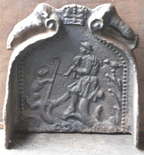

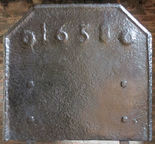
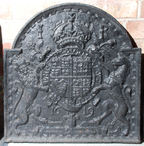
.jpg)
